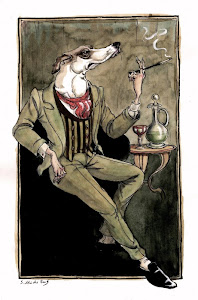 Conducting a spring inventory of my library, clad in robe and skull-and-crossbone slippers, I recently discovered two copies of the book, The Last Leopard: A Life of Giuseppe Tomasi di Lampedusa, acquired sometime in the early 1990s. It must have affected me significantly in some way. So I am submitting this post in the hope that you, too, will find the subject, Giuseppe Tomasi di Lampedusa (1896-1957), author of The Leopard and The Professor and the Siren, of some interest. Here is a published description:
Conducting a spring inventory of my library, clad in robe and skull-and-crossbone slippers, I recently discovered two copies of the book, The Last Leopard: A Life of Giuseppe Tomasi di Lampedusa, acquired sometime in the early 1990s. It must have affected me significantly in some way. So I am submitting this post in the hope that you, too, will find the subject, Giuseppe Tomasi di Lampedusa (1896-1957), author of The Leopard and The Professor and the Siren, of some interest. Here is a published description: At age 47 Giuseppe Tomasi, prince of Lampedusa, still slept in the bedrom where he had been born. The abnormally taciturn recluse, who mined the history of his Sicilian aristocratic family in its ruinous decline for his classic novel The Leopard, had a "vexatious, disappointing and often pathetic life." His arrogant, sharp-tongued father, fueled by a ridiculous sense of pride, spent much of his life quarreling with relatives over money. Lampedusa's domineering mother nearly wrecked her son's marriage to psychoanalyst Beatrice Mastrogiovanni, a largely epistolary relationship for years at a stretch. In this elegant, sprightly biography, Gilmour draws an incisive portrait of a curious modernist outsider deeply skeptical of all human motives. Lampedusa's fictional counterpart, Don Fabrizio, The Leopard's protagonist, likewise seems a contemporary figure swinging from hedonistic pursuits to the contemplation of eternity without a personal God.






















1 comment:
I don't know why but I couldn't get all the way through "The Leopard".
For some reason the biography of Lampedusa seems much more interesting than his actual written works.
Post a Comment